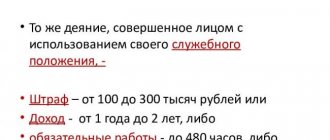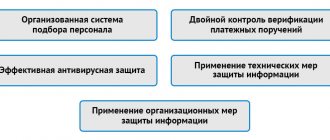One of the most popular crimes is petty theft. Many people are interested in the question: up to what amount of theft falls under Art. 7.27 Code of Administrative Offenses of the Russian Federation? The amount of maximum damage should not exceed 1000 rubles (2500 rubles in some cases). If damage is caused above the specified threshold, the case will be investigated as criminally punishable under the relevant article of legislation - Art. 158 of the Criminal Code of the Russian Federation.
There are often cases of falsification of a crime by store employees or an accidental coincidence of circumstances due to which a person comes under suspicion. To avoid becoming accused in an administrative case, it is better to consult with an experienced lawyer in advance on all situations and legitimate issues.
In the material presented, we will tell you how theft and petty theft differ, what liability the violators face, and whether reconciliation of the parties in such cases is possible.
What is petty theft
Let's figure out what is included in the concept of petty theft, whether it is a crime or an administrative violation, and how it differs from classic theft. To do this, let's delve into the regulations, but first we note that theft is the illegal taking of someone else's property, free of charge and without the voluntary consent of its owner. It can be committed secretly, openly, by deception (gaining trust), with the use of violence or the threat of violence, and in other forms.
In accordance with the provisions of Article 7.27 of the Code of Administrative Offenses of the Russian Federation, petty theft includes the taking of another person's property of a small amount (its amount is discussed further in the text). In addition, an important circumstance is the manner in which it was committed. According to Art. 7.27, petty theft of someone else’s property is an act committed in the form of theft, fraud and other relatively “peaceful” means. If it falls under Art. 7.27, then this is qualified as an administrative offense and is not a crime.
However, under certain circumstances, petty theft is a crime falling under the Criminal Code of the Russian Federation. According to the provisions of Art. 158.1 of the Criminal Code, this is the act:
- corresponding to the conditions of Art. 7.27 Code of Administrative Offenses of the Russian Federation;
- committed by a person who was previously convicted and has been punished for petty theft under Part 2 of Art. 7.27.
Thus, petty theft is transferred to the category of crimes after its repetition by those previously punished under Part 2 of Art. 7.27 offender. Petty theft is especially common in food supermarkets. This is facilitated by the availability of goods, the ability to easily hide and take them out of the store, keeping them from the cashier.
Often petty thefts are classified as thefts, and there are reasons for this: in Art. 7.27 of the Code of Administrative Offenses of the Russian Federation, theft is specified as one of the forms of this offense. At the same time, theft differs from petty theft in that it can be much more large-scale and daring in its execution. For example, if the value of the stolen property is significant or several people took part in the theft by prior conspiracy.
Signs of petty theft
The criminological characteristics of petty thefts include both an assessment of the nature of such acts and the personal characteristics of the thieves. Petty theft includes acts such as theft or fraud on a minor scale. They are committed in ways that are not dangerous to society, without threats or violence.
The subjective side of petty theft assumes that the thief has financial problems that do not allow him to ensure a normal level of consumption by legal means. Often such acts are committed by people who are confused in life, homeless people, and teenagers from dysfunctional families. If they do this, it is without careful planning of the “operation”, and sometimes spontaneously, under the influence of momentary moods or alcohol.
Composition of the offense and qualifications
First, let’s look at the term “theft” itself. It is interpreted as illegal actions aimed at the gratuitous seizure of other people's property for the purpose of their subsequent appropriation or sale in any way.
The object of the crime is property relations , and the subject is any property that has been withdrawn from civil circulation.
The objective side is expressed in such forms as theft, fraud, embezzlement or misappropriation, but with an important clarification: without the presence of qualifying signs of criminal offenses. In other forms, for example, petty theft, there will be no crime.
Reference. Theft is understood as a secret act characterized by the seizure of other people's objects or money. Moreover, it is secret both for the owner himself and for witnesses.
Fraud is the theft of property by deception or abuse of trust of the injured party.
Appropriation is interpreted as the use of other people's property for one's own purposes without the owner's permission , and embezzlement is interpreted as their consumption.
The crime is completed at the moment when the attacker has already taken possession of other people's objects, which he has encroached on, and is ready to dispose of them at his own discretion or in favor of other persons.
The subject of the offense is a capable person who has reached 16 years of age.
The subjective side is a form of guilt expressed in the form of direct intent, as well as the presence of selfish goals. If the purpose of taking possession of someone else's property was to destroy or damage it, which did not result in causing significant damage, then the offense will be qualified under Art. 7.17 Code of Administrative Offenses of the Russian Federation.
Determining the motives for the offense is also very important for distinguishing it from such a form of theft as robbery. After all, if the criminal knew that he was being watched or could be watched (if there were surveillance cameras), then it would be classified as robbery. Otherwise, it can be considered petty theft.
The subject of petty theft of another person's property is a citizen who has reached 16 years of age and is fully sane.
Punishment for petty theft
So, you already know that petty theft can be an administrative offense or a criminal offense, depending on the circumstances of its commission. In the first case, the offender faces punishment for petty theft under Art. 7.27 of the Code of Administrative Offenses of the Russian Federation, in the second - under Art. 158.1 of the Criminal Code of the Russian Federation. The theft of someone else's property is considered petty if it was not committed in an open form or without the use of violence (threat of violence), and the value of the stolen property is no more than 2 thousand rubles (Part 2 of Article 7.27 of the Code of Administrative Offenses of the Russian Federation).
In Art. 7.27 of the Code of Administrative Offenses stipulates that an act falls within its scope if there are no signs of crimes under Art. 158 and other articles of the Criminal Code of the Russian Federation. Therefore, for example, petty theft by a group of persons by prior conspiracy can be regarded as a crime under Part 2 of Art. 158 of the Criminal Code of the Russian Federation. The statute of limitations for petty theft, recognized as an administrative offense, is two months, and if a judge makes a ruling, it is three months (Part 1 of Article 4.5 of the Code of Administrative Offenses of the Russian Federation). If theft is qualified under Art. 158.1 of the Criminal Code of the Russian Federation, this period is increased to two years (part 1.a of Article 78 of the Criminal Code of the Russian Federation).
Administrative responsibility
Liability for petty theft is provided for in Article 7.27 of the Administrative Code of the Russian Federation. Let us recall that petty theft falls under administrative jurisdiction if the amount stolen does not exceed 2 thousand rubles, and the administrative offense itself is committed in the form of theft and other non-violent actions.
In accordance with the provisions of Art. 7.27 of the Code of Administrative Offenses of the Russian Federation, the following penalties are provided for this offense. In case of theft in the amount of up to 1 thousand rubles (Part 1 of Article 7.27)::
- fine up to 5 times the value of the stolen property, min 1 thousand rubles;
- arrest up to 15 days;
- compulsory work up to 50 hours.
In case of theft in the amount of 1 thousand to 2 thousand rubles (part 2 of article 7.27):
- fine up to 5 times the value of the stolen property, min. 3 thousand rubles;
- arrest from 10 to 15 days;
- compulsory work up to 120 hours.
If the act is qualified as fraud, then the offender faces a fine of up to 5 times the value of the stolen property, minimum 5 thousand rubles (Article 7.27.1 of the Code of Administrative Offenses of the Russian Federation).
Criminal liability
Criminal liability for petty theft is provided for in Art. 158.1 of the Criminal Code of the Russian Federation. It is applied in the case of petty theft committed by a person subjected to administrative punishment under Part 2 of Art. 7.27 of the Criminal Code of the Russian Federation, that is, for repeated petty theft. Under this article, someone found guilty of committing a crime may be given one of the following punishments:
- a fine of up to 40 thousand rubles (or in the amount of salary or other income for a period of up to 3 months);
- compulsory work up to 180 hours;
- correctional labor for up to 6 months
- restriction of freedom up to 1 year;
- forced labor for up to 1 year;
- arrest up to 2 months;
- imprisonment for up to 1 year.
What actions are considered theft?
The answer to the question of what theft is was given by the Supreme Court of the Russian Federation. So, theft is the illegal gratuitous seizure and (or) conversion of someone else’s property for the benefit of the perpetrator or other persons, committed for personal gain, causing damage to the owner or other holder of this property. It’s a rather cumbersome design, but all the elements must be there to qualify the action as theft. Namely:
- selfish goal - the desire to obtain property benefits, to cause damage to the owner of such property
- illegality - a person has no rights to commit such actions. Even supposed ones.
- gratuitous seizure - the property ceases to be in the possession of the owner, an equivalent replacement is not provided
- damage to the owner arises from the purpose and nature of the actions.
At what age does responsibility begin?
Punishment for petty theft can be applied not only to an adult, but also to a minor. Administrative liability for petty theft begins at the age of 16 (Part 1, Article 2.3 of the Code of Administrative Offenses of the Russian Federation). At the same time, petty theft by minors can be considered by the commission on juvenile affairs, and according to its decision, other measures of influence, rather than administrative measures, can be applied to the offender.
The age of criminal responsibility is established by Art. 20 of the Criminal Code of the Russian Federation, and according to Part 1 of this article, in the general case it is 16 years. Part 2 of Article 20 of the Criminal Code of the Russian Federation reduces it to 14 years for crimes committed under a number of articles, including Art. 158 (“Theft”), however Art. 158.1 is not included in this list. Therefore, thieves from the age of 16 face criminal liability, as well as administrative liability.
Qualification of the crime
The object of petty theft is material objects, and the attacker encroaches on the right of ownership guaranteed by the Constitution of the Russian Federation.
The subject of the crime is a person who has reached the age of 16. Theft, including petty theft, is always committed with direct intent for the main reasons: hooliganism, selfish motives. The offense is considered completed from the moment the owner loses the right to dispose of his property and the transfer of this right to the guilty person.
Note!
In case of petty theft committed by a child under 16 years of age, an administrative protocol is not drawn up, but the owner of the outlet has the right to recover damages from his parents by filing a claim in court.
Arrests
For example, there are arrests. They are administrative. In simple terms, the offender is put in a “monkey barn” for a certain period of time to punish. And give time to think about your behavior.
To be honest, this measure is very common. But the arrest period is not impressive. After all, in Ukraine, such an act is punishable by only 5-10 days in prison. Not too much, if you think about it. However, when a crime is committed only for the first time, such a measure takes place.
Concept and types of theft
“theft” should be defined .
In general, this term means the unlawful appropriation by a citizen of someone else's property. Any theft is illegal and free of charge.
Through theft, damage is caused to the owner of the stolen property, usually material, and the object of such an offense is property that has a certain marketable value .
There are several forms of theft:
- hidden theft (theft);
- open theft (robbery);
- open theft, in which the criminal used violence that endangered the life and health of the victim (robbery);
- theft by gaining the trust of the victim or by deceiving him (fraud);
- illegal use of entrusted property (embezzlement);
- theft of property in emergency situations (looting);
- theft of property belonging to the church (sacrilege).
The legislation of the Russian Federation also mentions the following types of theft:
- petty theft. Such an atrocity is classified as an administrative offense and is punishable in accordance with the Code of Administrative Offenses of the Russian Federation (CAO RF)
- grand theft;
- theft on an especially large scale;
- theft that caused such harm to the victim that cannot be classified into one of the above categories.
Both movable property and immovable property can be stolen.
Practice
How are things really going? In reality, violators are not always sentenced to punishment according to the law. Most often, petty theft of property is accompanied by aggravating circumstances. And they are just capable of “diversifying” the sentence of the guilty.
For example, a robber will not only have to endure fines and arrests, but also compensate for moral and material damage to the victim. A common case, especially when it comes to a primary crime.
In addition, very often people simply do not report petty thefts and try to sort everything out themselves, either amicably or with the help of their fists. This is especially true in situations where someone close to you is guilty. It is not recommended to do this. Otherwise, you can become guilty under the article “Battery” or something like that. If you don’t want to file a corresponding complaint with law enforcement agencies, you can try to talk to the criminal and resolve everything verbally. But not with fists. It is preferable, of course, to do everything according to the law.
As you can see, there is not much difference in punishments in Ukraine and Russia for petty theft. This is far from the most dangerous crime, so no serious preventive measures are used. In general, as already mentioned, the articles provide only for a crime in its pure form. Without any aggravating circumstances. If there are such penalties, the penalties will become more severe.
How to find out the value of stolen property
The total value of the stolen goods is determined according to average market prices. Sometimes experts are brought in to conduct assessment procedures.
Please note that the amount of stolen goods is calculated based on the actual value of the stolen goods, i.e. at the purchase price. The store's markup is not included in the calculations.
Example : if you stole a bottle of cognac for 1800 rubles, and the store purchased it at a price of 850 rubles, then such an act will not qualify as a criminal offense. It is considered an administrative offense.
The amount of the stolen goods plays a major role in determining liability - administrative or criminal.
When is it counted?
But how can we determine what crime was committed? The point is that this act has a certain “value”, that is, an amount that is recognized by the court as small. In such a situation, it can be assumed that an illegal seizure of property in small amounts was committed.
But what specific cost are we talking about? In what case is an illegal act classified as petty theft? The amount of damage for this offense does not exceed 1000 rubles. This is exactly the rule that applies in the Russian Federation. In Ukraine this is 0.2% of the minimum wage. True, in Russia a certain “increase in the cost” of crime is currently being discussed. And it is proposed to set the bar at 5,000 rubles. Not the best option, but it hasn't been accepted yet. And it is unknown whether such a decision will enter into legal force.
Definition and signs
According to Article 7.27 of the Code of Administrative Offenses of the Russian Federation, petty theft means the theft of items whose value does not exceed 2,500 rubles .
Such theft can be carried out through theft, robbery, fraud or embezzlement, however, cases of robbery or robbery with the aim of appropriating such objects are already punishable under Articles 161 and 162 of the Criminal Code of the Russian Federation, respectively.
When the court classifies theft as petty, only the value of the stolen property is taken into account .
Petty theft is often confused with theft, robbery and robbery , unless we are talking about crimes committed with aggravating circumstances, on a large or especially large scale.
When the court classifies theft as petty, the value of the stolen property is taken into account first.
In practice, the value of property is assessed by the police, taking into account the testimony of the victim, as well as based on a comparison of the price of the stolen item with the price of items similar to it.
The comparison is carried out by evaluating certificates received from trading enterprises that have similar items in their assortment; In addition, the comparison takes into account the value of the item at the time of its acquisition by the injured party.
In turn, attempted petty theft is considered an intentional act aimed at committing theft, fraud, misappropriation or embezzlement, if for some reason it was not completed.
Also read: Article for stealing money: what punishment faces
It is important to note that when classifying an offense, the following aggravating circumstances are also taken into account:
- Commitment of theft by a group of persons in conspiracy or by an organized criminal group.
- Committing burglary.
- Committing theft from objects that were near the victim during the commission of the crime.
If any of the above signs are present, the offense falls under the jurisdiction of the Criminal Code of the Russian Federation .
Also, when classifying an offense, the past of the perpetrator is taken into account: if he has already committed administrative or criminal offenses, that is, the theft was a relapse, more stringent preventive measures will be applied to him.
The above provisions were confirmed by the decision of the Plenum of the Supreme Court of Russia dated May 25, 2021.
Petty theft. Distinction between criminal and administrative liability:
Games with freedom
There is also a restriction of freedom. Exactly the same as in Ukraine. This preventive measure is expressed in the form of so-called administrative arrest. The offender is given time to think about his behavior and a chance to correct himself. No fines or other monetary penalties are provided for in this situation.
How long can a violator be jailed? The deadline is set individually. But it cannot exceed 15 days. Most often, it is the maximum administrative arrest that will be imposed during proceedings. This measure is actively used in Russia whenever possible.










